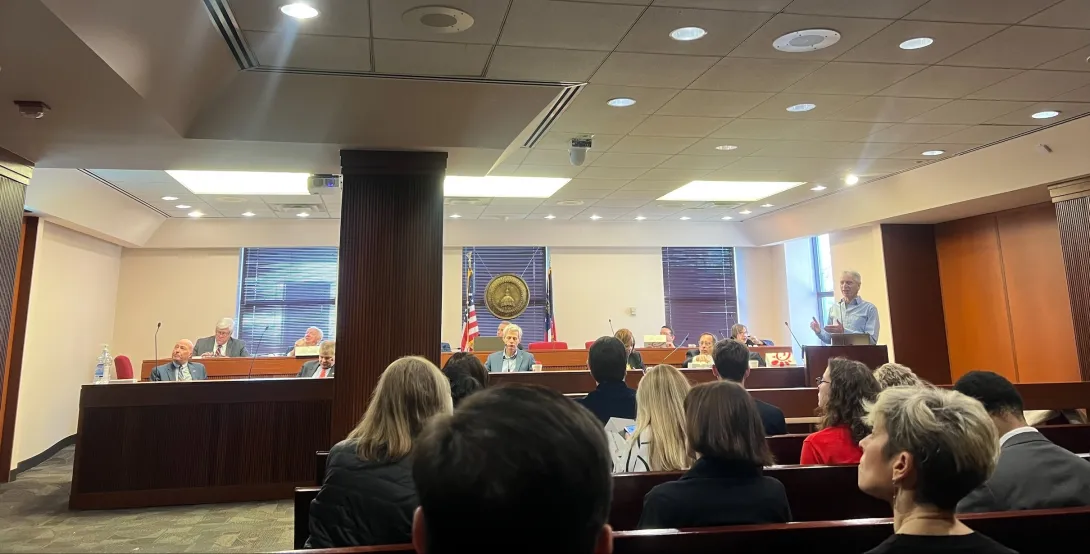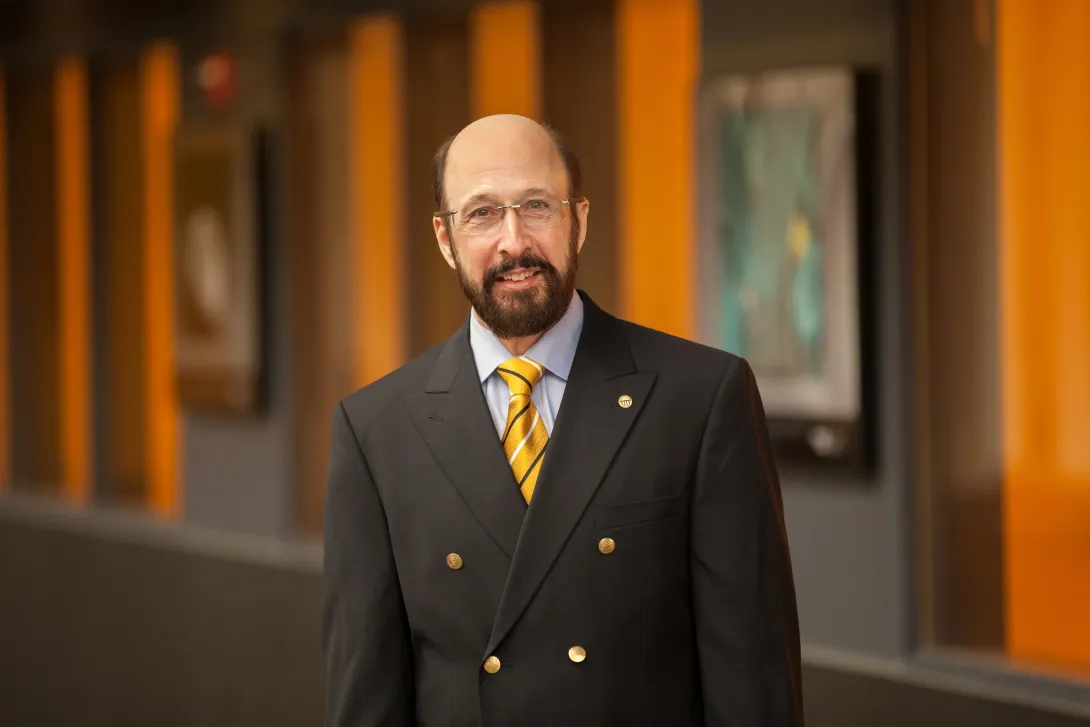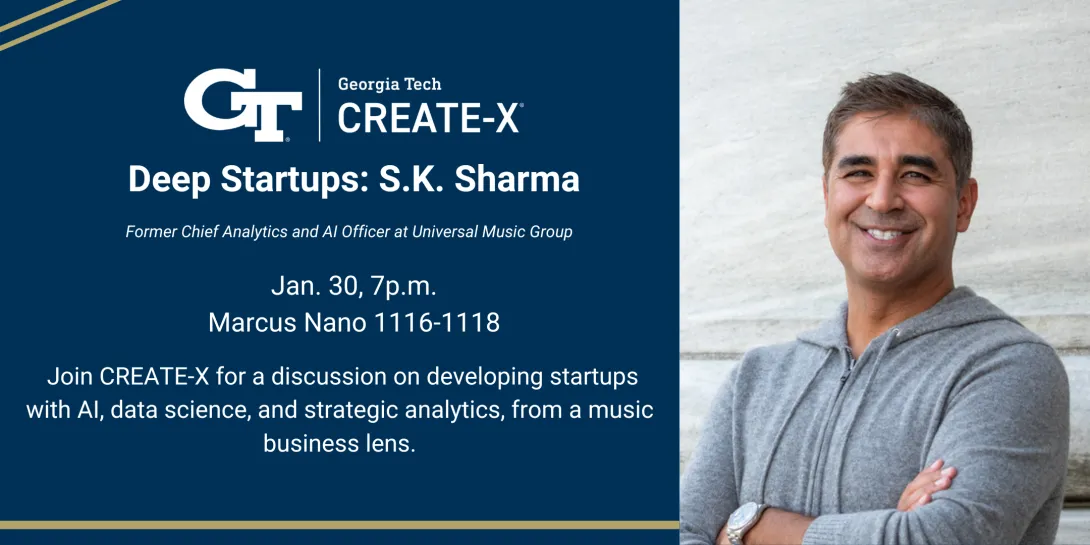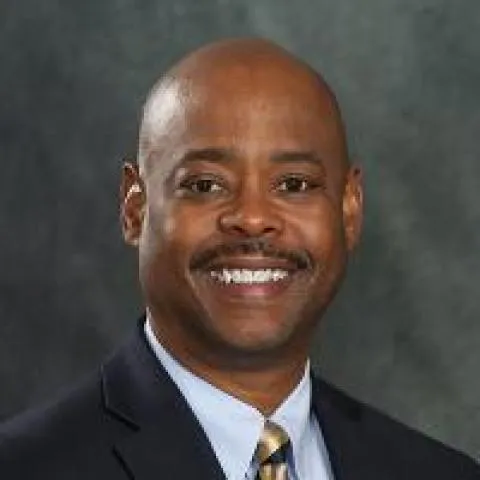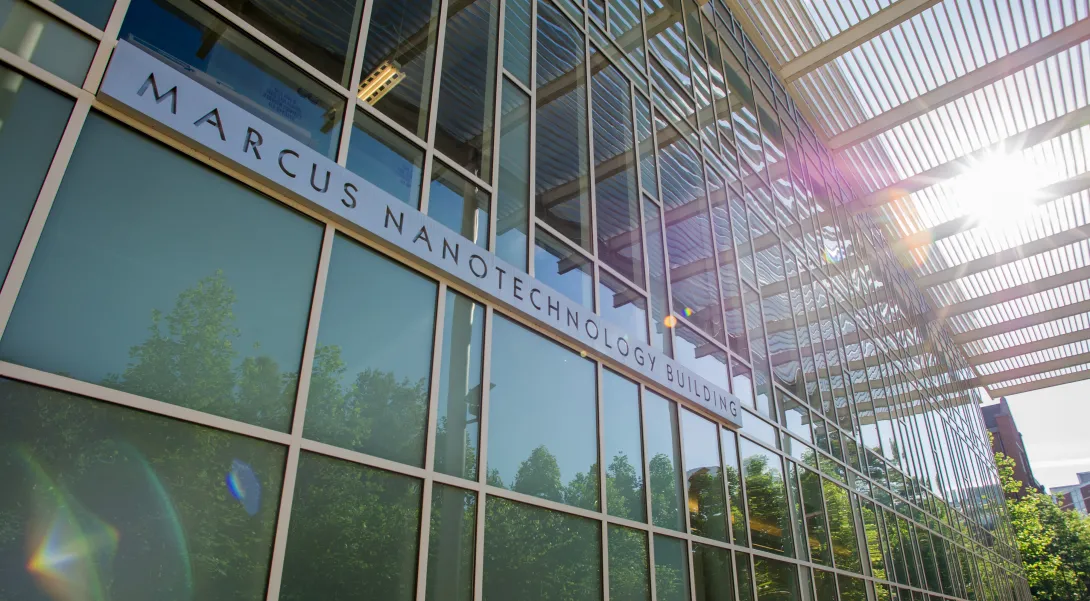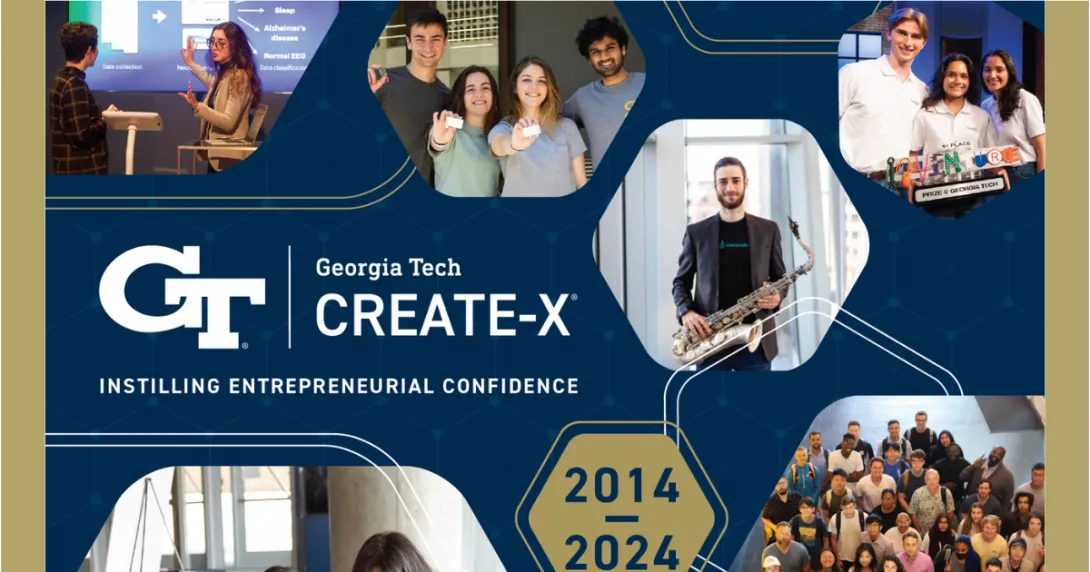Feb. 04, 2025
Pascal Van Hentenryck, professor and chair of the School of Industrial and Systems Engineering at Georgia Tech, as well as director of Tech AI and the NSF AI4OPT Institute, presented at the Georgia Department of Human Services’ Annual HR Conference, held Jan. 28-30, 2025, at the Savannah Convention Center.
Themed “Customer-Centric Culture,” the event explored how leaders and employees can harness AI for customer engagement. Key topics included: defining AI, guiding workforce adaptation to AI-driven changes, and debunking myths, emphasizing AI's role as a vital tool rather than a threat.
To learn more about the Georgia Department of Human Services, click here.
Feb. 04, 2025
The Georgia Legislator AI Workshop took place at the Georgia State Capitol, drawing state lawmakers, academic experts, and industry leaders to explore the transformative role of artificial intelligence, Jan. 28, 2025.
The event was designed to provide legislators with a comprehensive understanding of how AI is reshaping key sectors, including energy, manufacturing, education and cybersecurity. Georgia Tech’s prominent role in AI research and application was highlighted through contributions from its leading faculty and research experts.
Tim Lieuwen, interim executive vice president for Research at Georgia Tech, opened the workshop, amplifying the strategic importance of AI for Georgia’s economic development and infrastructure resilience. Pascal Van Hentenryck, director of the Tech AI Hub and the NSF AI4OPT Institute, followed with a presentation on AI advancements and their implications for the state.
A significant portion of the workshop focused on AI’s impact on energy infrastructure. Lieuwen returned to discuss how AI is enhancing energy efficiency and supporting Georgia’s transition to smarter, more resilient energy systems. This session highlighted AI’s role in driving sustainable energy solutions.
The conversation then shifted to manufacturing, with Tom Kurfess, chief manufacturing officer at Georgia Tech, detailing how AI-driven innovations are optimizing production processes and revolutionizing industry practices. His insights described a future where AI maintains Georgia’s competitiveness in the manufacturing sector.
Cybersecurity and data privacy were other focal points. Michael Barker from Georgia Tech’s Manufacturing Extension Program addressed the challenges and opportunities surrounding AI-driven cybersecurity solutions. His presentation touched on data privacy and compliance with public information regulations.
The educational landscape also took center stage as Steve Harmon from Georgia Tech’s College of Lifelong Learning explored the ways AI is reshaping learning experiences. Harmon highlighted AI’s potential to deliver personalized education and better prepare students for a rapidly evolving workforce.
Donna Ennis, interim associate vice president for community-based engagement and co-director of Georgia AIM, wrapped up the program by presenting a comprehensive overview of state and national AI resources available to foster innovation and collaboration.
This event highlighted the importance of strategic investments and informed policymaking to harness the full potential of AI for Georgia’s future.
Feb. 03, 2025
Pursuing entrepreneurship is an exciting and rewarding experience. You have the power to solve real-world problems and make an impact. Here are six things you can do to begin your entrepreneurial journey.
1. Identify a Problem You’re Interested in Solving
We often gravitate toward familiar problems, but it's crucial to explore beyond our immediate surroundings. Take the time to venture off campus and learn about problems faced by small businesses, corporations, and communities. Engaging with diverse groups will help you uncover unique challenges that you might not have considered. We accept startups in a variety of industries, from fashion to healthcare.
2. Understand the Problem Before Creating a Solution
It's tempting to rush into building a solution once you've identified a problem. However, it's essential to thoroughly understand the problem first. Before you start building, conduct at least 10 – 20 customer discovery interviews. This will give you valuable insights into the problem you're solving and help you validate your business thesis.
3. Start With Your Business Thesis
Formulate a clear business thesis: "X will buy Y because of Z." Here, X represents your target customer, Y is your product, and Z is the reason they will purchase it. As you engage with potential customers, refine your hypothesis based on their feedback. This iterative process will help you develop a product that meets real needs.
4. Build a Version 1 of Your Product
This is easier than it sounds and can be very low-tech to start. Concentrate on developing the core functionality of your product that addresses the primary pain point for your users. This unlocks user insights that can help you know if and where to pivot your solution.
5. Think About Your Business Model
While you don't need to have a concrete business model from the start, it's beneficial to brainstorm potential models. Consider how your product could generate revenue and sustain itself. Your business model can evolve as you gain more insights and experience.
6. Put in the Time
Launching a startup requires a significant time commitment and focus. You can create real momentum when you can dedicate consistent time.
Looking for more support on your entrepreneurial journey? Be sure to check out Startup Launch, a 12-week accelerator that helps you move from idea/prototype to your first customer. You have access to expert mentors, exclusive founder-focused workshops, vendor discounts, and $5,000 in seed funding.
The application deadline is Monday, March 17, for the summer cohort.
A previous info session on Startup Launch and a Startup Launch sample application are available to help students prepare. Attend CREATE-X events to get insights into entrepreneurship, workshop business ideas, find teammates, and prepare your Startup Launch applications. For additional questions, email create-x@groups.gatech.edu.
News Contact
Breanna Durham
Marketing Strategist
Jan. 29, 2025
Noura Howell and Joe Bozeman lead the “Microscale Thermal Tech for Sustainability” research initiative for the Institute for Matter and Systems at Georgia Tech. Their research in this role focuses on sustainable thermoregulation strategies for climate change resilience. Howell is an assistant professor of digital media in the Ivan Allen College of liberal Arts, and Bozeman is an assistant professor of Civil and Environmental Engineering.
In this brief Q&A, Howell and Bozeman discuss their research focus, how it relates to Matter and System’s core research focuses, and the national impact of this initiative.
What is your field of expertise and at what point in your life did you first become interested in this area?
Howell's field of expertise is Human-Computer Interaction, particularly embodied interaction design research and design futuring. Embodied interaction design research is about designing interactions with technologies that involve more of humans' bodies beyond just eyes on a screen and hands on a mouse or keyboard. Thermal perception (feeling warmth and coolness) is an important part of human embodied experience, and designing technologies for thermal perception is an exciting area of design research. Design futuring, Howell's other sub-speciality, offers ways to envision, discuss, and debate future scenarios with technology. So, this proposal uses design futuring to explore alternative futures for thermal technologies for sustainability.
Howell has been interested in sustainability ever since she was a kid growing up playing in the woods in Florida, picking wild citrus, watching the lizards, frogs, snakes, armadillos, and birds, helping the tortoises cross the road, and canoeing near gators. Howell has been interested in thermal interactions ever since she was a kid in elementary school on the hot Florida playground, touching a hot metal jungle gym bar, and noticing that it felt so hot that it felt cool. Much later, she learned about thermoreceptors in our skin and that this phenomenon is called paradoxical cold, when some cold receptors in our skin respond to high temperatures.
Bozeman's field of expertise is in sustainable energy development, climate change adaptation/mitigation, and developing equitable solutions for socioecological, urban carbon management, and food-energy-water nexus challenges. Bozeman does life cycle assessment and energy systems modeling for sustainability with a special emphasis on the social receptivity of technological administration.
Bozeman first became interested in this area during his time working for the public sector as a sustainability officer and energy manager. In those roles, he oversaw and addressed many sociotechnical challenges regarding indoor comfort, air quality, and compliance with environmental protection laws. During this period, it became clear to him that more needed to be done in thermoregulation and the systems that facilitate it.
What questions or challenges sparked your current research?
Thermoregulation, or maintaining a healthy body temperature, is essential for survival. Meanwhile, the world is getting hotter, and humans must adapt. When people feel too hot, it can hinder their productivity, and extreme heat can lead to death. HVAC uses too much energy and struggles to accommodate the wide variety of thermal comfort preferences of building occupants, while many people work outdoors.
Our project tackles the challenge of sustainable thermoregulation.
Matter and systems refer to the transformational technological and societal systems that arise from the convergence of innovative materials, devices, and processes. Why is your initiative important to the development of the IMS research strategy?
This proposal combines thermal technology and microscale fabrication to innovate sustainable thermoregulation strategies for climate change resilience. This helps advance IMS research strategy in their interdisciplinary areas of microelectronic technologies, built environment technologies, and human-centric technologies. While this project is only a start, sustainable thermoregulation will require transformational technological and societal systems shifts arising from the convergence of innovative materials, devices, and processes, and so this project is a good fit for IMS, and we are very happy to be working on this project under the auspices of IMS.
What are the broader global and social benefits of the research you and your team conduct?
This proposal convenes transdisciplinary expertise across Georgia Tech and beyond to propose agenda-setting visions for future work to establish the significance of this research nexus on more sustainable ways to support people in maintaining a comfortable, healthy body temperature. This is an essential form of climate change resilience and adaptation. This proposal has the potential to impact science, technology, and society through bringing disparate disciplines together to establish a new research area of sustainable, microscale thermoregulation techniques for climate change adaptation. This research promises to conceptually advance the state-of-the-art via design futuring scenarios, future visions of just-around-the-corner possibilities in this new research area.
What are your plans for engaging a wider Georgia Tech faculty pool with the Institute for Matter and Systems research?
We will convene researchers across Georgia Tech and beyond to exchange expertise, brainstorm wild ideas, and synthesize ideas into design futuring scenarios. Stay tuned for interview and workshop opportunities.
Jan. 28, 2025
As you move your computer mouse around the screen or scroll on your phone to read these words, you’re using technology Russell Dupuis helped enable. Same for when you turn on an LED light bulb or scan groceries at the self-checkout.
The underlying technologies for those common devices are compound semiconductors manufactured using techniques Dupuis first demonstrated nearly 50 years ago. His work made it possible to mass produce and commercialize these semiconductors for LEDs, lasers, solar cells, and more.
Now his contributions have been recognized with the Japan Prize, one of a few internationally recognized awards regarded by much of the scientific community as second only to the Nobel Prize.
“Professor Russell Dupuis’ breakthrough led to the commercialization of compound semiconductor production. It has become the foundation upon which our modern information society is built,” the Japan Prize Foundation wrote in announcing Dupuis’ selection.
News Contact
Joshua Stewart
College of Engineering
Jan. 27, 2025
CREATE-X is set to host its next Deep Startups panel event on Thursday, Jan. 30, at 7 p.m. in the Marcus Nanotechnology Building Rooms 1116– 1118. The event will feature S.K. Sharma — former chief analytics and AI officer at Universal Music Group — and an expert in AI, data science, and strategic analytics. During Deep Startups, Sharma will dive into startup development within the context of the music business industry. Seating is limited. Students can register for Deep Startups on Engage. Faculty, staff, and the general public can register for Deep Startups on Eventbrite.
Deep Startups is a series that brings together knowledgeable entrepreneurs and Startup Launch alumni from various business sectors to discuss their experiences forming companies that address significant, contemporary challenges. Attendees spend an informative evening discovering the intersection of technology and entrepreneurship.
From 2016 until recently, S.K. Sharma led a global team of Ph.D. data scientists, engineers, and strategists at Universal Music Group (UMG) to develop innovative and scalable solutions that drive real-time market insights and audience engagement. His leadership has been instrumental in creating differentiated intellectual property and market-leading capabilities in AI, machine learning, and prescriptive analytics, earning him multiple patents in marketing analytics.
Sharma's academic background includes a Ph.D. in chemical physics and physical chemistry from Caltech. His research has been published in numerous peer-reviewed journals, and he has held concurrent roles in academia and industry, including senior research scientist at Caltech's Beckman Institute. His corporate career includes significant positions such as vice president at Lehman Brothers, executive director at UBS, and vice president and partner at Mitchell Madison Group, where he advised global private equity funds and venture capital managers.
In addition to his role at UMG, Sharma is an entrepreneur in residence at UC San Diego's Office of Innovation and Commercialization, where he supports pioneering advancements in science and engineering. He is also an investor at Provisio Medical, a company revolutionizing endovascular procedures with its Sonic Lumen Tomography technology.
Sharma's contributions to the field of AI and analytics have been widely recognized. He was awarded Billboard magazine's 40 Under 40 and has been a commencement speaker at UC San Diego's Jacobs School of Engineering. His work in developing AI-driven marketing technologies has set new standards in the industry, ensuring compliance with global privacy regulations while driving significant improvements in marketing efficiency.
Attendees of Deep Startups will hear practical knowledge and actionable advice on entrepreneurship from Sharma. Each CREATE-X event is an opportunity to network, build ideas, and prepare for the Startup Launch program, which provides $5,000 in optional seed funding, $150,000 in in-kind services, mentorship, entrepreneurial workshops, networking events, and resources to help build and scale startups. Students, faculty, researchers, and alumni interested in developing their own startups are encouraged to apply. The deadline to apply for Startup Launch is March 17, 2025. Spots are limited. Apply now for a higher chance of acceptance and early feedback. If you have any questions about getting started, email us at create-x@groups.gatech.edu.
News Contact
Breanna Durham
Marketing Strategist
Jan. 21, 2025
George White, senior director of strategic partnerships, has been named a member of the inaugural National Semiconductor Technology Center (NSTC) Workforce Advisory Board (WFAB).
“The appointment to the Natcast Workforce Advisory Board is truly an honor and represents an opportunity for myself and my esteemed colleagues to help increase U.S. competitiveness in this most consequential sector,” said White.
Comprising U.S. leaders focused on growing the semiconductor workforce from the private sector, higher education, workforce development organizations, the Department of Commerce, and other federal agencies, the WFAB will support the efforts of the recently established NSTC Workforce Center of Excellence (WCoE). It will offer critical input on national and regional workforce development strategies to ensure WCoE initiatives are employer-driven, worker-centered, and responsive to real-time industry challenges.
Read the full release from Natcast
Jan. 21, 2025
Georgia Institute of Technology is set to play a crucial role in a strategic effort funded by the Defense Advanced Research Project Agency (DARPA) to help bolster America’s national security and global military leadership.
The project, led by the Texas Institute for Electronics (TIE) at The University of Texas at Austin, represents a total investment of $1.4 billion. The $840 million award from DARPA, announced by TIE in 2024, aims to develop the next generation of high-performing semiconductor microsystems for the Department of Defense (DoD).
“We are honored to collaborate with TIE and its broader team on this far reaching and strategic program to enable best in class 3D heterogeneous integration (3DHI) processes and technologies in the United States,” said Muhannad S. Bakir, the Dan Fielder Professor in the School of Electrical and Computer Engineering and director of the 3D Systems Packaging Research Center, who is heading the project for Georgia Tech.
3DHI is a semiconductor manufacturing process that incorporates different materials and components into microsystems with precision assembly. The use of 3DHI allows for the creation of high-performance, compact, and energy-efficient systems.
The investment is part of DARPA’s Next Generation Microelectronics Manufacturing (NGMM) Program comprised of 32 defense electronics and leading commercial semiconductor companies and 18 nationally recognized academic institutions.
Under the agreement, TIE will establish a national open access R&D and prototyping fabrication facility. The facility will enable the DoD to create higher performance, lower power, lightweight, and compact defense systems. The advancements are expected to have wide-ranging applications, including radar, satellite imaging, and unmanned aerial vehicles.
Georgia Tech will provide a wide range of expertise in 3DHI including design, fabrication and assembly processes, and characterization to support the NGMM national open-access R&D and prototyping facility at TIE.
Regents' Professor and Morris M. Bryan, Jr. Professor Suresh K. Sitaraman in the George W. Woodruff School of Mechanical Engineering will be a key contributor to Georgia Tech’s efforts on the project.
“We are delighted to be partnering with UT/TIE on the establishment of a 3D Heterogeneous Integration Microsystem prototyping facility,” said Sitaraman. “In addition to advancing fundamental science, this project is a great opportunity for Georgia Tech to demonstrate and integrate our ground-breaking and innovative 3DHI research approaches and technology solutions into TIE’s prototyping facility, and understand the challenges involved when translating lab-scale research work to a large industry-strength fabrication facility.”
ECE Professors Saibal Mukhopadhyay, Arijit Raychowdhury, Visvesh Sathe, and Shimeng Yu will be working alongside Bakir and Sitaraman.
A significant portion of the research will be conducted at the Institute for Matter and Systems (IMS), which operates Georgia Tech’s state-of-the-art electronics and nanotechnology core facilities.
Read the press release from TIE and view the project’s team and partners.
News Contact
Dan Watson
Jan. 17, 2025
Founded in 2014, CREATE-X has grown from a visionary concept into a transformative program that has empowered more than 34,000 students to launch more than 560 startups, achieving a total portfolio valuation of over $2 billion. The report, “CREATE-X: A Decade of Success,” reviews the first 10 years of impact and mission.
CREATE-X was established to instill entrepreneurial confidence in Georgia Tech students and provide them with the knowledge, skills, and experiences needed to create their own future. From its humble beginnings with eight teams, the program has expanded to include three distinct branches: Learn, Make, and Launch. These branches cater to the multifaceted needs of entrepreneurial students, offering courses, mentorship, seed funding, and opportunities to develop and launch startups.
Through our value pillars of experiential education, entrepreneurial confidence, and real-world impact, we strive to enable our students to solve the problems they are passionate about solving. And as we look to the future, CREATE-X aims to become the nation’s top startup campus, launching 300 startups each year.
Our commitment to nurturing student innovation and expanding entrepreneurial education remains steadfast. We invite all Georgia Tech students, faculty, alumni, and the public to join us in this exciting journey. Together, we create the future.
Interested in creating your own startup?
Georgia Tech students, faculty, researchers, and alumni interested in developing their own startups are encouraged to apply to CREATE-X’s Startup Launch. The program provides $5,000 in optional seed funding, $150,000 in in-kind services, mentorship, entrepreneurial workshops, networking events, and resources to help build and scale startups. The program culminates in Demo Day, where teams present their startups to potential investors. The deadline to apply for Startup Launch is March 19, 2025. Spots are limited. Apply now for a higher chance of acceptance and early feedback.
For students interested in taking a CREATE-X course, consider exploring Startup Lab, Idea to Prototype, and CREATE-X Capstone Design. These courses can be taken in any order to fit your schedule, and they offer opportunities for funding and other resources. The deadline for applications and registrations for these courses is Jan. 6 for Spring 2025 and May 12 for Summer 2025.
And as always, we invite you to attend our CREATE-X events. CREATE-X hosts workshops and events throughout the year, focusing on brainstorming and receiving feedback on startup ideas, networking and building a team, understanding the legal landscapes of startups, hearing founder insights, and witnessing the latest innovations at Georgia Tech. We hope to see you there.
Interested in supporting CREATE-X?
Faculty members interested in getting involved with CREATE-X can participate as teachers or mentors in various programs such as Startup Lab, CREATE-X Capstone, Idea to Prototype, and Startup Launch. Faculty can also apply for the next cohort of the Jim Pope Fellowship when it opens in the spring. For additional information or inquiries, contact the director of CREATE-X, Rahul Saxena, at rahulsaxena@gatech.edu.
For those interested in donating to or partnering with CREATE-X, your generosity and collaboration is greatly appreciated. Donations to CREATE-X can be made through Georgia Tech’s Give Campus portal. For questions and requests to collaborate, please email create-x@groups.gatech.edu.
CREATE-X appreciates the unwavering support from our community, donors, and partners. Your contributions have been instrumental in shaping the entrepreneurial landscape at Georgia Tech.
To our students, we encourage you to continue being bold, creative, and fearless in your pursuits. CREATE-X is here to support you every step of the way, providing the resources, mentorship, and opportunities you need to turn your ideas into reality.
News Contact
Breanna Durham
Marketing Strategist
Jan. 16, 2025
Two Georgia Tech professors have earned the Presidential Early Career Award for Scientists and Engineers, the highest honor bestowed by the U.S. government on early-career engineers and scientists.
Juan-Pablo Correa-Baena, associate professor and Goizueta Early Career Faculty Chair in the School of Materials Science and Engineering, and Josiah Hester, associate professor in the School of Interactive Computing, are among this year’s nearly 400 honorees.
Correa-Baena is recognized for his solar cell and semiconductor research with the U.S. Department of Energy. His research group focuses on understanding the relationship between chemistry, crystallographic structure, and properties of new, low-cost semiconducting materials used for optical and electronic applications. His team also works on advanced techniques for characterizing these very small materials and their interactions.
“I wanted to research something that would benefit society while also using chemistry, physics, and involved materials discovery to inform that. That is why I work on solar cells — because this area of research is so important,” said Correa-Baena.
Correa-Baena leads a solar energy materials research initiative for Georgia Tech’s Institute for Matter and Systems and the Strategic Energy Institute. He also has a secondary appointment in the School of Chemistry and Biochemistry.
“My career goal has always been to execute high-quality research,” he said. “Receiving this award is a testament to the work our lab is doing, my student and faculty collaborators at Georgia Tech, and simply being in the right place at the right time.”
Read more about Correa-Baena’s work.
Hester said his nomination was based on the National Science Foundation Faculty Early Career Development Program award he received in 2022 as an assistant professor at Northwestern University.
“For me, I always thought this was an unachievable, unassailable type of thing because of the reputation of the folks in computing who’ve won previously,” Hester said. “It was always a far-reaching goal. I was shocked. It’s something you would never in a million years think you would win.”
Hester is known for pioneering research in a new subfield of sustainable computing dedicated to creating battery-free devices powered by solar energy, kinetic energy, and radio waves. He co-led a team that developed the first battery-free handheld gaming device.
Last year, he co-authored an article published in the Association of Computing Machinery’s in-house journal, the Communications of the ACM, in which he coined the term “Internet of Batteryless Things.”
The Presidential Early Career Award for Scientists and Engineers was established by President Bill Clinton in 1996. It honors individuals for their contributions to science and technology and promotes awareness of STEM careers. The award also supports the missions of participating agencies and strengthens the link between research and societal impact. This year’s winners will be invited to visit the White House later this year.

